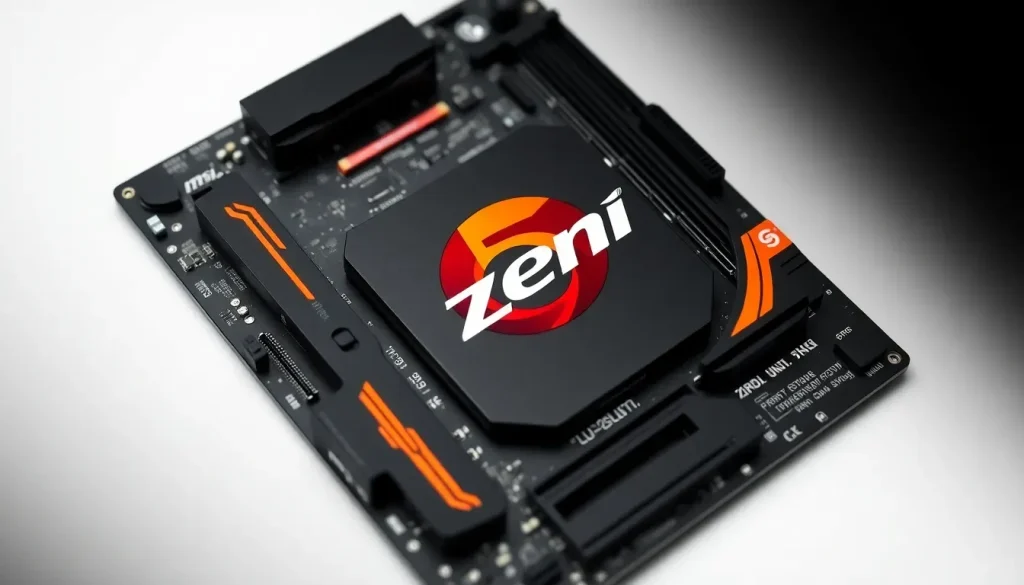MSI confirms Zen 6 processors will work with AM5 motherboards

In a rapidly evolving tech landscape, AMD continues to make headlines with its innovative advancements in processor technology. Recently, MSI confirmed that its current lineup of 800 series motherboards with the AM5 socket will support the upcoming Zen 6 processors. This exciting news not only highlights AMD's commitment to backward compatibility but also reassures users who have invested in current hardware and are looking forward to future upgrades.
As the first motherboard manufacturer to confirm support for AMD's desktop processor dubbed "Olympic Ridge," it positions Zen 6 as the third microarchitecture designed for the AM5 socket, following its predecessors, Zen 4 and Zen 5. This aligns with AMD's tradition of supporting multiple generations of processors on a single socket, a practice that has become increasingly valued among PC builders and enthusiasts.
Understanding the AM5 Socket and Its Compatibility
The AM5 socket is a crucial component in AMD's roadmap, designed to provide flexibility and longevity for users. Launched alongside the Ryzen 7000 series based on Zen 4, the AM5 socket has already proven to be a robust platform, supporting a wide range of processors:
- Ryzen 7000 series (Zen 4)
- Ryzen 9000 series (Zen 5)
- Ryzen 8000G series (APUs)
- Future Ryzen processors based on Zen 6
This level of compatibility is a significant advantage for consumers, as it enables them to upgrade their CPUs without needing to replace their motherboards. This kind of foresight from AMD ensures a seamless transition between generations, enhancing the overall value of the AM5 platform.
What We Know About Zen 6 Processors
The upcoming Zen 6 processors aim to maintain and enhance the architectural innovations seen in previous generations. These processors are expected to utilize:
- A chiplet architecture with a CPU chiplet (CCD) and an I/O die (IOD).
- A manufacturing process utilizing TSMC's advanced N2 node at 2 nm, offering better power efficiency and performance.
- Increased core counts per CCD, a first in the Ryzen lineup.
Additionally, the integration of a new customer I/O die (cIOD) fabricated on TSMC’s N4P node at 4 nm is anticipated. This will likely lead to a lower thermal design power (TDP) and support for faster DDR5 memory speeds, further enhancing system performance. The expected improvements in working frequency will also make the generational leap from Zen 5 to Zen 6 more substantial than the previous transition.
Release Timeline for Zen 6 Processors
AMD aims to launch the Zen 6 processors in the second half of 2026. This timeline indicates a strategic approach to development and marketing, allowing AMD to refine its offerings based on user feedback and performance testing. With multiple generations of processors supported on the AM5 socket, users can expect a vibrant ecosystem as new technologies are introduced.
The Impact of AM5's Longevity on Users
The longevity of the AM5 socket is particularly significant for the DIY PC building community. Many enthusiasts prefer to invest in high-quality motherboards that can adapt to future technology. The assurance that the AM5 socket will support at least three generations of CPUs means that users can make informed decisions about their hardware investments without the fear of obsolescence.
Some potential benefits include:
- Reduced costs due to less frequent motherboard replacements.
- Improved performance as new CPUs are released without needing a full system overhaul.
- Greater innovation as motherboard manufacturers develop new features for the existing socket.
MSI's Commitment and Future Developments
MSI is at the forefront of this transition, launching new 800 series motherboards equipped with advanced features like:
- External BCLK generator for overclocking capabilities.
- A robust BIOS/UEFI with 64 MB of storage for firmware updates.
- Enhanced compatibility with future Ryzen CPUs and corresponding microcode updates.
This commitment to performance and user experience is indicative of the competitive landscape in which AMD and its partners operate. As the demand for high-performance computing continues to rise, innovations from companies like MSI will play a pivotal role in shaping the future of PC architecture.
For those interested in a visual representation of what AMD has planned for the future, here is an insightful video that discusses the Zen 6 processors:
Conclusion: The Future of AMD and AM5
The confirmation that Zen 6 processors will run on AM5 motherboards solidifies AMD's strategy to create a more sustainable and user-friendly hardware ecosystem. As technology continues to evolve, the ability to upgrade CPUs within the same motherboard framework not only enhances consumer confidence but also fosters a more dynamic and innovative computing environment.
With AMD's continued focus on reducing power consumption and increasing performance through advanced manufacturing processes, the future looks promising for both casual users and hardcore enthusiasts alike.




Leave a Reply